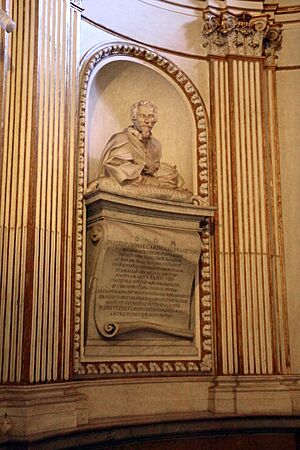Fausto Poli facts for kids
Quick facts for kids His Eminence Fausto Poli |
|
|---|---|
| Cardinal-Priest of San Crisogono Archbishop (Personal Title) of Orvieto |
|

Monument to Fauso Poli by Giuseppe Mazzuoli, San Crisogono, Rome
|
|
| Church | Catholic Church |
| Orders | |
| Consecration | 25 Jul 1633 by Antonio Marcello Barberini (seniore) |
| Personal details | |
| Born | 17 February 1581 Usigni, Italy |
| Died | 7 October 1653 (age 72) Orvieto, Italy |
Fausto Poli (born February 17, 1581 – died October 7, 1653) was an important leader in the Catholic Church. He served as a prelate, which is a high-ranking church official, and later became a Cardinal. Cardinals are special advisors to the Pope.
Contents
Fausto Poli's Life and Career
Fausto Poli was born in a town called Usigni in Umbria, Italy. When he was a young man, he moved to Rome. There, he was noticed by Maffeo Barberini, who was a church official and also from Umbria. Barberini later became Pope Urban VIII.
Early Roles and Church Service
In 1632, Fausto Poli was given important jobs. He became the Majordomo, which means he was in charge of the Pope's household. He was also the Prefect of the Lateran palace, where he helped organize church events and court ceremonies.
On July 25, 1633, he became an Archbishop. This is a senior bishop who oversees a large area of churches. He also served as a nuncio, which means he was the Pope's official representative, in Vienna. He worked with the Infanta Maríe, who was the sister of King Philip II of Spain.
Supporting the Arts
Fausto Poli was also the private secretary to Pope Urban VIII. One of his key roles was to help the Pope, who loved collecting art, find old artworks or order new ones. He supported many artists, including the famous painter Claude Lorrain. In 1641, Poli even asked Lorrain to paint a well-known artwork called Seaport with the Embarkation of Saint Ursula.
Becoming a Cardinal
Towards the end of Pope Urban VIII's time as Pope, Fausto Poli was given a very high honor. On August 31, 1643, he was made a Cardinal. He became the Cardinal-Priest of San Crisogono in Rome. The next year, in 1644, he was also appointed the Bishop of Orvieto.
He took part in the Papal conclave of 1644. This was a special meeting where cardinals chose the next Pope, who turned out to be Pope Innocent X.
Devotion to Saint Rita
Throughout his life, Fausto Poli cared deeply about his hometown and the region he came from. He helped make Usigni more beautiful. He also worked to develop iron mines in the area, which helped the local economy.
Poli was very devoted to Saint Rita of Cascia. She was declared a saint by Pope Urban VIII in 1627. Fausto Poli helped decorate her church in Cascia and worked hard to spread her story and popularity. Many people believe he was the main reason Saint Rita became so well-known and loved. A book about Saint Rita's life and miracles, published in 1652, was even dedicated to him.
Death and Burial
Fausto Poli passed away in Orvieto in 1653. According to his wishes, he was buried in the Chapel of the Guardian Angel. This chapel is located in his own church, San Crisogono, in Rome.
 | Selma Burke |
 | Pauline Powell Burns |
 | Frederick J. Brown |
 | Robert Blackburn |

